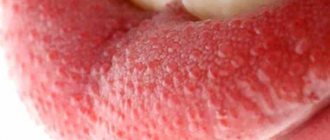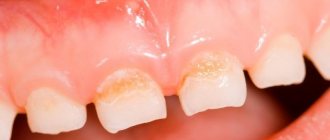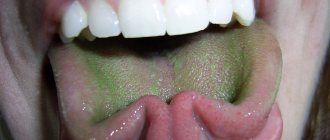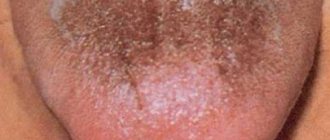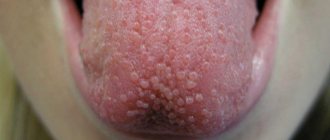Everyone has had to deal with unpleasant sensations in the mouth, but not with a burning sensation. This symptom is not very common, which is why it takes many people by surprise. The patient is not entirely clear what to do and who to contact.
There are several causes of burning in the mouth and tongue
, and in order to correctly prescribe treatment, the specialist will first have to go through all possible options, prescribe a comprehensive diagnosis and identify the disease that provoked such symptoms.
Dental causes of burning sensation in the mouth
When the first symptoms appear, you should contact your dentist, because most often the reasons are related to his profile:
- Oral candidiasis
A burning sensation in the mouth and tongue after prosthetics or filling in most cases indicates poor quality of the procedure. The dentist could damage the mucous membrane during the operation or incorrectly manufacture the prosthesis itself. Some patients are allergic to the filling composition.
- With candidiasis, the tip of the tongue stings the most, there is a feeling that the palate is burned, and there is a bitter taste. Sometimes there is pain in the throat area. The disease manifests itself due to the active proliferation of yeast fungus against a background of weakened immunity.
- Stomatitis
The cause of the disease can be glossitis. With this disease, due to the action of viruses and bacteria, the entire mucous membrane of the tongue experiences a strong burning sensation.
- Aphthous stomatitis is another disease that causes a burning sensation in the mouth. With it, small ulcers form on the mucous membrane, which hurt when touched. There is an unpleasant sensation in the mouth, like a burn from hot drinks.
Functions of the sky and structural features
The palate is a vault that separates the oral cavity from the nasopharynx. The structure of the palate consists of two sections - hard and soft. This organ performs an important function - it prevents food from entering the nasopharynx from the oral cavity.
In addition, receptors on the surface of the palate are associated with the larynx and take part in articulation and influence the timbre of the voice and the pitch of sounds. Thus, the inflammatory process of the upper palate disrupts all the functions of this important organ, and therefore requires mandatory treatment.
What disease can cause a burning sensation in the mouth?
If there is fever and general malaise, as well as other additional symptoms, the source should be sought in more serious diseases:
- The cause of a burning sensation in the mouth and throat is sometimes hidden in disorders of the gastrointestinal tract (GIT). Most often, people suffering from colitis or pancreatitis have to deal with this symptom.
- The patient may only feel that his mouth is baking and bitter. This is how the body reacts to serious stress; in such a state, the human body can behave unpredictably.
A feeling of dryness and burning in the mouth is one of the most common signs of both types of diabetes.
- Hormonal imbalance, especially at the very beginning of menopause, can cause burning in the gums. In this case, bitterness is sometimes felt on the tongue.
- Sjögren's syndrome does not appear so often, but still it should not be written off. The disease is called dry syndrome, since for no apparent reason it causes a disruption in the secretion of external glands, which ultimately leads to xerostomia - lack of saliva.
- Sometimes an acute deficiency of nutrients, primarily folic acid and vitamin B12, leads to the symptom. Usually in such cases it is the palate in the mouth that burns.
External reasons why it may bake in the mouth
Sometimes unpleasant sensations on the palate and tongue appear due to the occurrence of a serious illness, and it happens that the mucous membrane stings due to the influence of external factors that are easy to eliminate:
- Most often, the cause of baking in the mouth is mechanical damage to the mucous membrane.
People can injure their tongue and lips while eating; less often, poor-quality dental care leads to damage to the oral mucosa. - If the palate and tongue are burned by hot food or drinks, the discomfort will continue for at least a few more days. Sometimes the burning sensation continues after the tissue has healed.
- You may develop an allergic reaction to oral care products. For many, this symptom is caused by the presence of sodium lauryl sulfate in toothpaste. It dries out the mucous membrane, which gradually provokes itching and a feeling that the person’s whole mouth is on fire. It is better to put such pastes away.
- Taking some medications can also have unpleasant side effects. The most common causes of burning are iodine-containing medications, antihypertensive drugs when taken uncontrolled, and vasoconstrictors.
A feeling similar to that of a burn to the mucous membrane is often a side effect of chemotherapy.
Diagnosis of burning in the mouth
In most cases, burning of the oral mucosa is not at all associated with diseases of the teeth and gums. Despite this, if you feel itching, you should first contact your dentist, especially if you have recently had prosthetics or fillings done.
The specialist will examine the oral cavity and, if dental problems are detected, prescribe the necessary treatment. In addition, the dentist can give recommendations on how to eliminate dry mouth, because it is the precursor to discomfort. In this case, even traditional methods will be useful.
If the dentist was unable to cure the patient, he will have to undergo a series of tests and examinations by a neurologist, gastroenterologist, otolaryngologist and endocrinologist. First of all, blood is collected and a swab is taken from the tongue. Once the original disease is identified, the patient will be prescribed the correct treatment.
Treatment for burning sensation in the mouth
First of all, you need to find out the cause of the burning sensation in the mouth. If the problem is related to diseases and conditions of the oral cavity and teeth, then in the dental clinic the patient is given one or more of the following measures:
- Professional teeth cleaning – removal of plaque, stone, sanitation of the oral cavity.
- Treatment of dental diseases - caries, pulpitis.
- Treatment of gum diseases – gingivitis, periodontitis.
- Assessment of the condition of dentures and their effect on the oral mucosa. If necessary, prosthetic structures are replaced.
In addition to the above procedures, therapeutic measures for burning in the mouth also include taking anti-inflammatory, antibacterial or antifungal (for candidiasis) drugs. If there is a lack of vitamins and minerals, a course is prescribed to replenish the missing biologically active substances. Some patients are prescribed physical therapy.
Treatment of burning sensation in the mouth and tongue
The emphasis is on eliminating the cause of the burning sensation in the mouth, but additional measures necessary to alleviate the symptoms are also prescribed.
Treating the underlying cause of pinching
If it becomes clear that the cause of the burning sensation in the mouth lies in a serious disease, first all efforts will be directed specifically at eliminating it. A therapist or specialist doctor may prescribe the following treatment:
- If an allergy is detected, the patient is prescribed antihistamines. It is recommended to completely avoid contact with the allergen.
- In case of a lack of nutrients, which has led to unpleasant sensations in the mouth and tongue, special medications are prescribed. Moreover, preference is given not to complexes, but to those products that contain only the necessary substances. In this case, these include B vitamins and folic acid.
Fungal diseases should be treated with antibiotics and disinfectant rinses.
- If problems with hormonal levels are detected, a thorough examination is first carried out, which can take more than one month. All this time, the patient is prescribed medications that relieve the burning sensation in the throat and tongue, and only at the very end are hormonal medications prescribed.
- For diabetes, medications are also recommended that can alleviate the patient’s condition. The main treatment is medication and diet, which you will have to follow for the rest of your life.
- If the mucous membranes of the mouth, tongue and lips “burn” due to stress or dry syndrome, the patient will have to visit a neurologist, and sometimes even a psychologist. Usually in such cases it is most difficult to eliminate dryness and burning, since the causes of such symptoms are not completely clear.
Treatment for burning mouth at home
Treatment is divided into two stages: addressing the underlying cause and taking steps to relieve symptoms.
One without the other will be ineffective. To relieve the patient from burning of the oral mucosa, the following recommendations are usually given:
- Regular rinsing of the mouth with diluted antiseptics: Chlorhexidine, Furacilin, Miramistin. The composition is not so important, the main thing is that the product gets rid of bacteria.
- If there are damage to the mucous membrane, it is necessary to treat them with iodine-based ointments or other drugs that promote rapid healing.
- You can get rid of a burning sensation in the mouth using ointments with an anesthetic effect. Remedies such as Kamistad and Lidocaine are excellent for pain relief.
- If your mouth is dry, the symptom can be treated with folk remedies. Rinsing with the addition of sea buckthorn oil will help best.
The list may be longer if there are other symptoms, such as fever or general malaise.
How to prevent burning in the future
In order not to encounter a burning sensation of the tongue and oral mucosa, you need to follow preventive measures:
- Try to sleep at least 7-8 hours a day. This will protect you from stress and weakened immunity - phenomena that often provoke a feeling of heat on the mucous membrane.
- Any bad habits, be it cigarettes or alcohol, must be eliminated from your lifestyle.
- Follow the basics of proper nutrition. Include as many fresh fruits and vegetables in your diet as possible. This is useful not only for teeth and gums, but also for the gastrointestinal tract.
- Maintain good hygiene. Simply brushing your teeth regularly is not enough; you need to visit a specialist once every 6 months, use mouth rinses, dental floss and other aids.
- Pay attention to the composition of hygiene products. If you have sensitive gums and teeth, try to choose toothpastes and rinses with gentler ingredients that do not cause a burning sensation in the mouth.
- Limit your use of chewing gum. Choose only those that do not contain sugar or xylitol.
- Reduce your intake of bitter, hot and sour foods.
- Avoid treating damaged areas with products based on alcohol, potassium permanganate and brilliant green.
When you notice the first unpleasant symptoms, contact a specialist for proper diagnosis and timely treatment.
Burning mouth syndrome
Probably every gastroenterologist in his practice has encountered a patient with complaints of pain or burning of the tongue. Turning to this specialist in the first place is probably due to the following logical chain: the tongue is in the oral cavity, where the digestion process begins, which means that if a problem arises, you should visit a gastroenterologist. Old publications also come to the aid of patients and doctors of other specialties, in which chronic diseases of the digestive organs were considered as the causes of burning tongue.
But is it really that simple? Is pain and burning of the tongue a separate disease and who should treat it?
A little history and terminology.
Pain/burning in the tongue has many synonyms: glossalgia, glossodynia, stomatodynia, glossopyrosis, oral paresthesia, neurogenic glossitis, tongue neurosis, glossalgic syndrome. This condition is traditionally part of the so-called burning mouth syndrome or “burnt mouth syndrome,” in which pain/burning sensations are localized in various areas: tongue, upper palate, gums, lower lip, pharynx.
Burnt mouth syndrome (SMS) was first described back in 1880; in the 20th century, the term glossodynia, i.e., appeared. pain in the tongue, since unpleasant symptoms from the tongue were most common. This syndrome was first identified as a separate disease in 2004.
Almost all existing review articles and recommendations consider glossodynia within the framework of the SOP. General recommendations for the diagnosis and treatment of ROP may be applicable to the special case of glossodynia.
Definition
The International Association for the Study of Pain has designated glossodynia and oral burning as chronic pain, specifically “burning pain of the tongue or other mucous membranes of the mouth.”
Later, a detailed definition was given for ORS: “a burning sensation or sensation of altered sensitivity in the oral cavity, repeated daily for more than 2 hours a day for more than 3 months, without obvious causative lesions on clinical examination and examination.”
Epidemiology
Data on the prevalence of ROP and tongue pain/burning separately still vary from study to study. The average incidence of all cases of oral burning (including but not limited to tongue burning) is 0.1-3.7% of the population. Women suffer from this syndrome 2.5-7 times more often than men, especially often over the age of 60 and after menopause.
Common causes of pain and burning in the mouth.
There are two groups of reasons why patients notice a burning sensation in the mouth:
1) Primary (idiopathic), when there are no diseases of the oral cavity and other organs and systems, this will be the true SOR.
2) Secondary, caused by local (localized in the oral cavity) and systemic causes (autoimmune diseases, deficiency conditions, etc.)
Causes of secondary burning sensation in the mouth/burning tongue.
Possible causes of secondary burning sensation in the oral cavity are diverse and, oddly enough, are rarely associated with pathology of the digestive organs. A review published in 2022 on this problem identified the following conditions and diseases responsible for the occurrence of burning sensation in the mouth:
Local factors:
A. Diseases, conditions and damage to the oral cavity:
- fungal infection (eg candidiasis)
- lichen planus
- pemphigoid
- pemphigus
B. Trauma
1) Mechanical
2) Chemical
A. From the patient's side:
- toothpastes with abrasives
- use of mouth rinses with ethyl alcohol
- medications such as aspirin (applied to the sore tooth); over-the-counter medications containing phenols, peroxide, sulfuric acid
- vitamin C (citrus fruits)
- sour drinks
- lozenges and cough suppressants with high menthol content
b. From the dentist:
- Irrigation of the oral cavity with solutions containing methyl methacrylate, formaldehyde, formocresol, sodium hypochloride
- acrylic resin
- eugenol
3) Thermal: spicy or hot food or drink
C. Parafunctional habits
- Tongue sticking out, cheek biting, excessive tongue brushing
- mouth breathing
D. Xerostomia or impaired quality/quantity of saliva
- consequences of radiation or chemotherapy, Sjogren's syndrome, pathology of the salivary glands
- side effects of medications (antihistamines, antidepressants, diuretics, steroid hormones, non-steroidal anti-inflammatory drugs, amphetamines)
- smoking
E. Allergic reaction/contact hypersensitivity
- products, additives, flavors
- colorings and flavors from oral care products
- dental materials (nickel sulfate, cobalt, zinc)
System factors
A. Deficiency conditions: decreased levels of iron, zinc, folic acid, vitamins B1, B2, B6, B12
B. Endocrine pathology
- diabetes
- hypothyroidism
- hormonal disorders (changes in cortisol/sex hormone levels)
C. Autoimmune diseases
- Sjögren's syndrome
- lichenoid reactions
- systemic lupus erythematosus
D. Other diseases
- gastroesophageal reflux disease
- celiac disease
- multiple sclerosis
- Parkinson's disease
- Fabry disease
E. Medicines
- angiotensin-converting factor inhibitors
- antiretroviral therapy
F. Peripheral and central neuropathies
- diabetic polyneuropathy, neuropathy due to renal failure, neuropathy due to systemic connective tissue diseases, neuropathy due to HIV infection, postherpetic neuropathy, neuropathy due to chemotherapy
As can be seen from this huge list, most cases of burning of the tongue and in the oral cavity in general are caused by a dental problem/pathology, neurological, endocrine and autoimmune diseases. Gastroenterological causes (for example, gastroesophageal reflux disease) are rather the exception to the rule.
Primary burning sensation in the oral cavity (BOR) and its causes.
If there are no indications of secondary causes of burning in the oral cavity, most likely there is a true SOR. This is an independent disease, the cause of which is still unclear. In its development, the role of psychological factors and mental disorders, changes in the nerve endings and conductive nerve fibers of the oral cavity, as well as the central nervous system is assumed.
Clinical manifestations of ROP.
Symptoms that may bother patients with ROP are:
1) Pain and/or burning in the mouth of varying intensity. Some patients describe these sensations as tingling or irritation, as well as impaired sensitivity. The pain often occurs spontaneously, is often symmetrical and does not necessarily affect only one area. In the case of glossodynia, pain/burning is most often localized in the anterior 2/3 of the tongue, on its back, and lateral surfaces. The pain is minimal in the morning immediately after waking up, increasing in intensity throughout the day. Eating spicy, hot foods and drinks, as well as stress and fatigue increase the pain/burning sensation.
2) More than 70% of patients, in addition to pain/burning, note changes in taste, a decrease in its intensity, as well as the appearance of a foreign taste (bitter, metallic, or a combination of both). Most often, the sensation of sweet and salty tastes is reduced, and sour tastes are perceived more intensely.
3) Dry mouth (xerostomia) is noted by 46-67% of patients with SOP, while according to research data, an objective decrease in the amount of saliva is not observed in them.
4) Association with burning/pain from other mucous membranes has also been described in patients suffering from ROP. Most often this is a burning sensation in the rectum and genital tract. An alternative may be a feeling of dry mucous membranes (eyes, genital tract in women)
5) Night sleep disturbances are common (in 80% of cases) in people with SRS
6) Anxiety and depression are frequent companions of SOR and glossodynia separately. A meta-analysis of clinical studies showed that anxiety conditions increase the risk of developing RAS by 2.6 times, and depression by 3.2 times. Cancerophobia, social phobia, neuroticism, etc. are also often noted.
7) ODS is characterized by an association with other diseases that manifest as chronic pain: fibromyalgia, chronic back pain, chronic pelvic pain, irritable bowel syndrome, etc.
Treatment of SOR.
1) Patient information and support
Many patients with chronic oral burning and pain do not understand why their symptoms persist for so long. An important task of the doctor is to explain to patients with SRS the possible mechanisms of the formation of unpleasant sensations. Patients should be reassured that their symptoms are not imaginary or related to any form of cancer. This support will reduce anxiety, depression, fear and frustration, especially in individuals who have had previous unsuccessful treatment experiences.
2) Local therapy
Local use of clonazepam in the form of mouth rinses showed good results in reducing the severity of pain/burning in the mouth. There is encouraging evidence for the topical use of capsaicin (a chili pepper alkaloid) in low concentrations.
3) Systemic therapy
Tricyclic antidepressants, antidepressants from the group of serotonin and serotonin/norepinephrine reuptake inhibitors, clonazepam, and antiepileptic drugs (pregabalin and gabapentin) are actively used as drugs for the treatment of ORA. The use of alpha-thioctic acid showed little effectiveness.
4) Non-drug psychotherapy
Given the frequent association of ODS with anxiety disorders, phobias and depression, non-pharmacological psychotherapy is an integral part of the treatment of this problem. Cognitive behavioral therapy, individual and group psychotherapy should be considered as methods of choice.
5) Physiotherapy and alternative treatments
Low-level laser therapy and acupuncture have been studied as methods for reducing pain. These methods were effective in some people with cerebral obstruction, but are not widely used.
Conclusion.
Identifying the causes of pain/burning in the oral cavity is a challenge for doctors of different specialties, but their friendly work allows us to solve the problem and improve the quality of life of patients.



